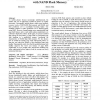Free Online Productivity Tools
i2Speak
i2Symbol
i2OCR
iTex2Img
iWeb2Print
iWeb2Shot
i2Type
iPdf2Split
iPdf2Merge
i2Bopomofo
i2Arabic
i2Style
i2Image
i2PDF
iLatex2Rtf
Sci2ools
143
click to vote
LCTRTS
2007
Springer
2007
Springer
SWL: a search-while-load demand paging scheme with NAND flash memory
As mobile phones become increasingly multifunctional, the number and size of applications installed in phones are rapidly increasing. Consequently, mobile phones require more hardware resources such as NOR/NAND flash memory and DRAM, and their production cost is accordingly becoming higher. One candidate solution to reduce production cost is demand paging using MMU. However, demand paging causes unpredictably long page fault latency, and as such mobile phone manufacturers are reluctant to deploy this scheme. In this paper, we present a method that reduces the long latency of page faults by performing page fault handling in a parallelized manner, considering the characteristics of NAND-Type flash memory. We also discuss how to modify the existing page cache replacement policies so that they can exploit the benefits of the parallelized page fault handler. Experimental results show that the parallelized page fault handler improves the worst case latency of page faults significantly, by u...
| Added | 08 Jun 2010 |
| Updated | 08 Jun 2010 |
| Type | Conference |
| Year | 2007 |
| Where | LCTRTS |
| Authors | Jihyun In, Ilhoon Shin, Hyojun Kim |
Comments (0)

